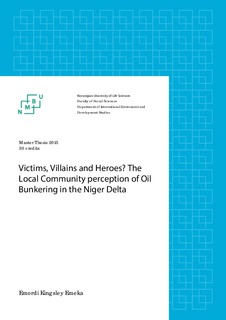| dc.description.abstract | Grounded on a political ecology approach, this study sheds light on oil bunkering activity that
is done by local militants in the Niger Delta region of Nigeria. Such oil bunkering is used as a
euphemism for oil theft in Nigeria. The purpose of this thesis is to investigate the perception of
oil bunkering that is done by groups (militants) of the local communities of the Niger Delta. By
collecting and comparing the narratives of the three actors linked to so-called illegal oil
bunkering. The three actors are the locals of the Niger Delta, the Nigerian government and the
multinational oil companies (MNOCs). Such Oil bunkering that is done by the local militants
of the Niger Delta has dominated the local politics since the 1990s. Through narrative analysis
I have identified three different stories from the three different actors.
The government and the Multinational oil companies (MNOCs) operating in the Niger Delta
perceives, such oil bunkering is seen as illegal activity that affects the nation’s economy, as well
as causing environmental degradation in the Niger Delta. However, oil have contributed
enormously to the national economy since the inception of oil exploration in the Niger Delta.
To many people, such as the government agencies and its allies, these growth have brought
income opportunities and growth to the local communities of the Niger Delta. In contrast to the
inhabitants of the Niger Delta such economic growth is yet to translate to economic
development, and an appreciable increase in the standard of living. Despite being the goose that
lays the golden egg. This is coupled with certain fundamental issues such as continuous neglect
by state, political marginalization and the failure of state interventionist efforts at ameliorating
the suffering of the inhabitants of the region. The consequence of this is reinforcing the option
of resistance and violence, as against peaceful engagement with the state. This is manifested in
the increasing violence and lawlessness epitomized by the incidence of kidnapping of oil
workers, seizure of MNOCs oil facilities, destruction of oil installations, as well as oil
bunkering which is the focus of this study.
By using narrative analysis, I found that the local communities sees oil bunkering as an integral
part of their protest against the state and the multinational companies operating in the Niger
Delta. This is an approach within political ecology, and narrative analysis offers a way of
obtaining a rich understanding of the main ways that locals of the Niger Delta experience and
perceives oil bunkering. As well as the state and MNOCs approach towards the locals, by means
of their presentations of relevant narratives. By doing this I also aim at contributing trend of
political ecology to the Niger Delta region. The local communities of the Niger Delta have been
11
embroiled in resistance against the federal government and the multinational oil companies
(MNOCs). Multilayered issues such as lack of control, participation, revenue allocation,
resources control and more, institute the main grievances against the oil companies and the
government. Cognizant of these issues, the state and MNOCs have not applied a more holistic
approach, for this reason the local communities in the Niger Delta lost confidence in both the
state and MNOCs. Hence these led to the issues the Niger Delta is facing today. Such Oil
bunkering activities done by the local militants of the Niger Delta is a classic example of the
perceived struggle and resistance of the Niger Delta militants over control of the natural
resources in their region. The local’s militants are indigenes of the Niger Delta, they represent
the resistance group and they are the main figure in oil bunkering.
This study carried a more in-depth analysis of the local communities’ narratives on oil
bunkering than other stakeholder’s narratives. However, this study also presented extensive
position of other actors narratives linked to oil bunkering in the Niger Delta. My reason for
doing this is that, as a researcher for this study I find the local communities of the Niger Delta
to constitute the most challenging task to understand. The locals are more challenging to
understand, because my main interest is to understand the local’s community’s perceptions.
Therefore deeper focus on these, whilst to understand the context of other narratives are
pertinent to identify the narrative landscape to compare and contrast. This study further argues
that oil bunkering activities in the Niger Delta emerged due to grievances by the people of the
Niger Delta, which is attributed to the failure of the state and the multinational oil companies
(MNOCs) to comply with the demands of the local community of the Niger Delta. This thesis
further shows that, the current oil bunkering activities in Niger Delta have become a mixture of
genuine grievance and greed as well as opportunism. | nb_NO |

